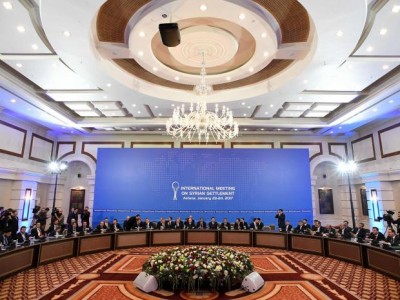Syria Ceasefire Conference in Astana, an Important Step Towards Peace

On January 24, Kazakhstan’s capital city Astana witnessed the final day of negotiations between Syria, Russia, Iran, Turkey and the Syrian armed opposition seeking a more comprehensive ceasefire for Syria. The Astana talks became a breakthrough in the process of resolving the Syrian crisis.
It was the first time the opposition was brought to table. The sides were able to include an effective role of Tehran and Ankara as guarantors, with Moscow, of the negotiations, and this contributed to the success of the talks. The sides say they are ready to start drafting a final peace agreement which, however, cannot be implemented without a number of conditions.
First of all, the guarantors concluded that the success of a peace process depends on separating the armed opposition from terrorists. Damascus and its allies argued this in early September 2016 when a short truce came into effect in Syria. The U.S., however, did nothing to support that and it refused to take part in a process of separation. Now, the future of this project looks more promising.
In Astana, the parties started to move towards it. They agreed on marking the combat lines with ISIS and to begin to identify Jabhat al-Nusra’s positions.
Another condition of an intra-Syrian agreement is a total ceasefire. Russia, Iran and Turkey agreed to create a mechanism to control a truce in Syria. In cooperation with Damascus, the parties will set up a trilateral monitoring body to enforce the ceasefire.
Of note is that U.S. Ambassador to Kazakhstan George Krol and UN Special Envoy for Syria Staffan de Mistura attended the talks.
Due to the recent U.S. presidential election, the White House has distanced itself from the Syrian crisis. The negotiations in the Kazakh capital may give momentum to a new course by Washington that would not be against the interests of the Syrian people.
As for the UN, Stefan de Mistura noted that UN Security Council was ready to discuss the results of the Astana talks and adopt the resolutions from there; in particular, those resolutions concerning the mechanism of ceasefire control.
The negotiations in Astana laid the groundwork for future collaboration between the Syrian parties, they showed a diplomatic solution is possible and they proved the parties’ willingness to end the bloody war in Syria as soon as possible. For its part, the Syrian opposition perhaps realizes that dialogue can yield more than war.
The next meeting between the Syrian government and the opposition is scheduled for February 8 in Geneva. These UN-sponsored talks aim for a comprehensive political settlement in Syria. The ceasefire talks in Astana have turned out to be a solid stepping stone towards working out a comprehensive peace agreement between all sides and more joint efforts in the fight against terrorism.

